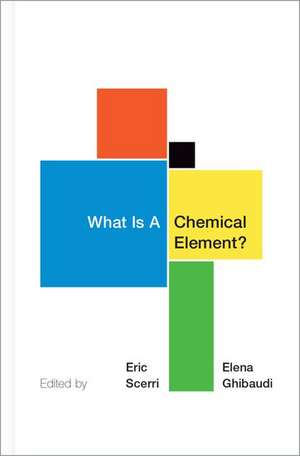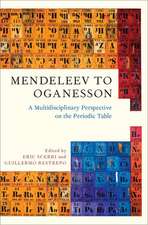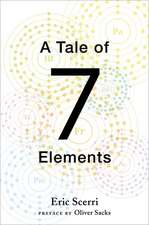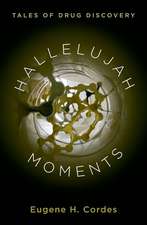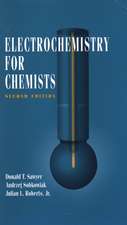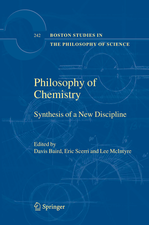What Is A Chemical Element?: A Collection of Essays by Chemists, Philosophers, Historians, and Educators
Editat de Eric Scerri, Elena Ghibaudien Limba Engleză Hardback – iul 2020
Preț: 614.27 lei
Preț vechi: 715.18 lei
-14% Nou
Puncte Express: 921
Preț estimativ în valută:
117.54€ • 123.16$ • 97.17£
117.54€ • 123.16$ • 97.17£
Carte tipărită la comandă
Livrare economică 31 martie-07 aprilie
Preluare comenzi: 021 569.72.76
Specificații
ISBN-13: 9780190933784
ISBN-10: 019093378X
Pagini: 312
Dimensiuni: 236 x 155 x 23 mm
Greutate: 0.59 kg
Editura: Oxford University Press
Colecția OUP USA
Locul publicării:New York, United States
ISBN-10: 019093378X
Pagini: 312
Dimensiuni: 236 x 155 x 23 mm
Greutate: 0.59 kg
Editura: Oxford University Press
Colecția OUP USA
Locul publicării:New York, United States
Recenzii
This volume marks a maturation in the field of philosophy of chemistry...Whether or not the reader is already acquainted with the problem of the element concept, they will find something of interest in this volume, as it builds upon recent literature without assuming a deep familiarity.
Essential reading for anyone with an interest in the philosophy of Cognitive Science.
Whether or not the reader is already acquainted with the problem of the element concept, they will find something of interest in this volume, as it builds upon recent literature without assuming a deep familiarity. They will find multiple answers to the question, 'What is a chemical element?'
This work will be of interest especially to philosophers and historians of science and of chemistry, as well as to practicing chemists and students of chemistry.
The essays in this book examine the concept of "element" from a variety of schools of thought, and they should prove interesting and informative to philosophers and historians of science in addition to practicing scientists (especially chemists) with a philosophical bent . . . the authors do a commendable job of illustrating the historical and philosophical points using chemical concepts that should be understandable to anyone who has completed a first-year undergraduate chemistry course. Similarly, most philosophical concepts used . . . are explained for the benefit of readers trained in natural science but not academic philosophy. The book is thus suitable for readers with a wide range of interests and academic backgrounds, and will surely stimulate many useful further discussions and debates.
I am not a chemist but I was able to learn from and be challenged by this volume with my interest in philosophy... I think the philosophers of chemistry as represented in this book would benefit from seeing how philosophers without a background in their discipline approach some of the broader questions they try to address. The philosophers in their turn would benefit from some particular knowledge of the sciences and of the work of scientists with a philosophical turn of mind, such as Scerri. This volume will reward reading by those with a serious interest in both philosophy and in the natural sciences.
With his pleasing writing style that combines scientific information, historical perspectives and personal reflection, this book will be an ideal starting point for readers new to Eric Scerri. Meanwhile, those more familiar with his scholarship will find enough that is new in this edition to maintain their interest.
This book, therefore, is a must-buy in the context of having a fundamental understanding of this central concept in chemistry... Of all the readers of this review who purchase this book, therefore, it is the chemical educators amongst you who will benefit the most.
The book...offers a series of wide-ranging and in part innovative scholarly analyses of the subject. The attentive reader will not find a final answer to what an element is, but he or she will better appreciate the complexity and many facets of the question.
Essential reading for anyone with an interest in the philosophy of Cognitive Science.
Whether or not the reader is already acquainted with the problem of the element concept, they will find something of interest in this volume, as it builds upon recent literature without assuming a deep familiarity. They will find multiple answers to the question, 'What is a chemical element?'
This work will be of interest especially to philosophers and historians of science and of chemistry, as well as to practicing chemists and students of chemistry.
The essays in this book examine the concept of "element" from a variety of schools of thought, and they should prove interesting and informative to philosophers and historians of science in addition to practicing scientists (especially chemists) with a philosophical bent . . . the authors do a commendable job of illustrating the historical and philosophical points using chemical concepts that should be understandable to anyone who has completed a first-year undergraduate chemistry course. Similarly, most philosophical concepts used . . . are explained for the benefit of readers trained in natural science but not academic philosophy. The book is thus suitable for readers with a wide range of interests and academic backgrounds, and will surely stimulate many useful further discussions and debates.
I am not a chemist but I was able to learn from and be challenged by this volume with my interest in philosophy... I think the philosophers of chemistry as represented in this book would benefit from seeing how philosophers without a background in their discipline approach some of the broader questions they try to address. The philosophers in their turn would benefit from some particular knowledge of the sciences and of the work of scientists with a philosophical turn of mind, such as Scerri. This volume will reward reading by those with a serious interest in both philosophy and in the natural sciences.
With his pleasing writing style that combines scientific information, historical perspectives and personal reflection, this book will be an ideal starting point for readers new to Eric Scerri. Meanwhile, those more familiar with his scholarship will find enough that is new in this edition to maintain their interest.
This book, therefore, is a must-buy in the context of having a fundamental understanding of this central concept in chemistry... Of all the readers of this review who purchase this book, therefore, it is the chemical educators amongst you who will benefit the most.
The book...offers a series of wide-ranging and in part innovative scholarly analyses of the subject. The attentive reader will not find a final answer to what an element is, but he or she will better appreciate the complexity and many facets of the question.
Notă biografică
Eric Scerri is a leading philosopher of science specializing in the history and philosophy of chemistry and especially the periodic table. He is also the founder and editor in chief of the international journal Foundations of Chemistry and has been a full-time lecturer at UCLA for the past twenty years where he regularly teaches classes of 350 chemistry students as well as classes in history and the philosophy of science. Altogether, Scerri has authored or edited a total of 11 books and over 150 journal articles.Elena Ghibaudi is a bioinorganic chemist with interest in the philosophy of chemistry and chemical education. She is Assistant Professor within the Department of Chemistry at the University of Torino in Italy, and she teaches classes in general and bioinorganic chemistry, as well as in chemical education. Ghibaudi is the author of several articles in the field of chemical education and the philosophy of chemistry including an influential article on the notion of chemicalelement. She is a member of the International Society for the Philosophy of Chemistry.
